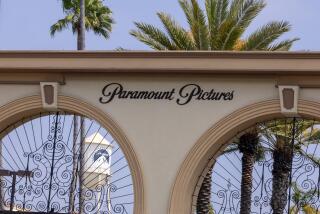Mediator’s Decision Favors Old Fabulous Inns Officers
- Share via
A court-appointed mediator ruled Monday that the stock owned by the ousted management of Fabulous Inns of America is valid, paving the way for a new board of directors’ election and, presumably, a new slate of corporate officers and executives.
Local attorney C. Hugh Friedman, who served as a court-appointed mediator through 10 weeks of tension-filled testimony, rejected claims by the current management that the majority shares owned by the ousted management were illegally obtained and should be invalid.
Although the ousted management “badly mishandled” company affairs “for their own benefit,” their actions do not justify voiding the shares, Friedman found.
Friedman, who sifted through 3,000 pages of trial transcripts and about 400 exhibits, recommended in a court filing to Superior Court Judge G. Dennis Adams that a new election be held soon to select new directors for the small but profitable Mission Valley hotel company.
Friedman also ruled that a special shareholders meeting last July 20 that purportedly reelected the ousted management was validly held. However, the results of that meeting are invalid, Friedman found.
Limit on Directors
To ensure that the ousted management--including former chairman Henry Maxwell and former president Walter Palmer--not control the five-person board, Friedman limited that group to two directors.
Maxwell and Palmer could not be reached for comment. However, their attorneys did little to hide their excitement.
“Our clients (can now) vote for whomever they want,” said attorney Gary S. Elster.
Fabulous Inns Chairman Jeffrey R. Krinsk, who as a dissident shareholder raised conflict-of-interest charges against Maxwell and Palmer during a heated annual shareholders meeting three years ago, conceded that Friedman’s ruling will return company control to his adversaries.
“We’ll be in office until the next election,” Krinsk said.
The ruling, he said, “wasn’t unexpected,” and he alleged that Friedman “exhibited intense prejudice from the beginning.”
Krinsk and his attorneys had previously argued that Friedman’s past ties to Palmer--he was Palmer’s attorney in the mid-1960s--represented a conflict of interest. However, the conflict issue was waived when Friedman claimed he could not recall his work for Palmer.
Krinsk on Monday said that he has since uncovered “additional information . . . documents indicating Friedman was the attorney for Palmer for a period of years.”
Krinsk, Yardley and their attorneys had argued that the shares of Maxwell, Palmer and others in the “control group” were obtained illegally 15 years ago from the shell of a bankrupt corporation.
‘Very Complicated’
Friedman, reached Monday, would not comment on the specifics of the case, saying only that it was “very complicated.”
Although he apparently ruled in their favor, Friedman took the ousted management to task for their actions while in control of Fabulous Inns.
This “is a classic case of a public corporation managed by controlling shareholders who tend to view the corporate enterprise as if it were theirs alone,” Friedman found. “They reflect the attitude that any crumbs they allow to fall from the corporate table are more than the other shareholders would otherwise have enjoyed if they hadn’t come along.”
Sources close to the case expect Adams to abide by Friedman’s findings. No court date for that final ruling has been scheduled.
Although Friedman’s filings settle some of the controversial issues at Fabulous Inns, controversy is bound to continue because of the handful of lawsuits filed by both sides against the other.
Making financial matters even stickier is the news that current management has written down the $1.45-million note it is owed by Maxwell to a value of only $100,000. That paper transaction has resulted in an extraordinary loss of $629,187 for the year ended Dec. 31, according to the company’s 10-K filing last week with the Securities and Exchange Commission.
Because of the writedown and $237,077 in legal expenses incurred in the bitter management dispute, Fabulous Inns reported a net loss in 1984 of $550,015.
Remains Profitable
Operationally, the company remains profitable, with income before the extraordinary loss of $316,250 compared to a loss the year before of $46,189. Revenue for the year jumped 40% to $2.1 million, while operating revenue increased 90% to $614,000.
Maxwell’s note was part of his purchase of the company’s share of Desert Isle, a Palm Springs time-share condominium project. Over the years, Fabulous Inns’ equity in the project had ballooned to 57%, or about $1.5 million.
Sparked by protests and investigations by Krinsk and other dissident shareholders, Maxwell was eventually ousted in mid-1983 and forced to buy Fabulous Inns’ share of Desert Isle. His note was secured by 360,000 shares of his Fabulous Inns common stock.
But when Maxwell tried to pay back the note in November, he found that current management had “legended” the shares with a warning that the stock’s validity was the subject of legal action. Maxwell at the time refused to accept the altered stock.
More to Read
Inside the business of entertainment
The Wide Shot brings you news, analysis and insights on everything from streaming wars to production — and what it all means for the future.
You may occasionally receive promotional content from the Los Angeles Times.










